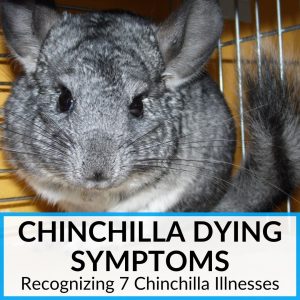
They can provide you a loving bond for more than a decade.
But sometimes things happen that are out of our control. Your chinchilla can fall ill, and even die a premature death.
Naturally, chinchillas have long life expectancies ranging upwards of 15 years.
But death sometimes occurs prematurely. To prevent this, it is essential understand how to take care of your chinchilla in the best fashion possible.
I will help you understand how to recognize illness in your chinchilla and how to identify some common signs that your chinchilla may be in bad shape.
This information is coming from a chinchilla owner who has been raising a chinchilla for the past 4 years and done a plethora of research on this topic.
But you need to know that I am not a vet. If you think you need a vet, consult one as soon as possible.
With that out of the way, let’s get right to it.
Contents
Chinchilla Dying Symptoms
To get started, I think it is important to note that as we discuss chinchilla dying signs or symptoms that you are more than likely just spotting and recognizing an illness.
Hopefully, in the early stages.
None of the items we discuss in this post are sure signs that a chinchilla is going to die. But they are signs that your chinchilla may have an illness that could ultimately lead to death.
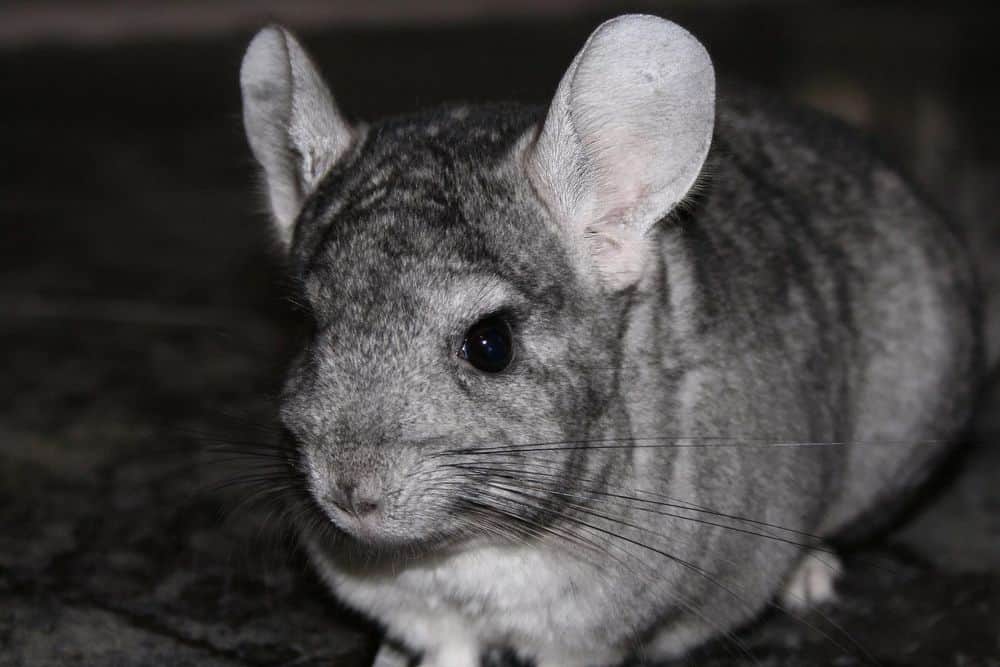
The reason I am saying this before diving too deep is simple.
If you recognize any of the issues, you still can consult a vet or intervene to get your chinchilla the care it needs.
If it turns out that it was a sign of dying than I deeply feel for your situation. I also have an article on what to do with your chinchilla after it has died, if the unthinkable does happen.
But I hope that the signs of chinchilla illness we discuss can help you recognize an illness faster, allowing you to get the help necessary or provide the care needed to nurse your chinchilla back to good health.
Common Signs Of Illness In Chinchillas
As we move into the primary information, let’s begin by breaking down common signs of illness with chinchillas.
If any of the following begin to occur or have already occurred, I highly recommend consulting a vet as soon as possible.
Dental Issues
Dental issues with chinchillas are one of the most common occurrences you will encounter and things like malocclusion can escalate into death if not treated when an issue does arise.
Chinchilla teeth continue to grow at a rapid pace throughout their lives, like many rodents.
If a tooth becomes overgrown, it can become infected.
It is essential to make sure that your chinchilla’s teeth remain a healthy orange/yellow color and the teeth do not have any chips or curls.
If a tooth problem occurs, you will likely be able to spot the issue if your chinchilla is not eating as frequently, drooling, or showing bald patches around the mouth or eyes.
Once you notice an issue with your chinchilla’s teeth, be sure to consult a vet to get the situation taken care of.
Respiratory Infections
Respiratory infections are the second most common illness with a chinchilla and can be caused by several different situations.
When they occur, they can be due to the temperature or environment where you are keeping your chinchilla. They are most easily recognized by discharge from the nose or more intense breathing.
If a respiratory infection continues without treatment, it can lead to death and cause other problems beforehand, such as anorexia and loss of appetite.
The best way to ensure your chinchilla stays healthy and does not develop an issue that falls into this category is to weigh your chinchilla from time to time to ensure it is maintaining weight and continuing to eat the proper amount of food.
Lack Of Appetite
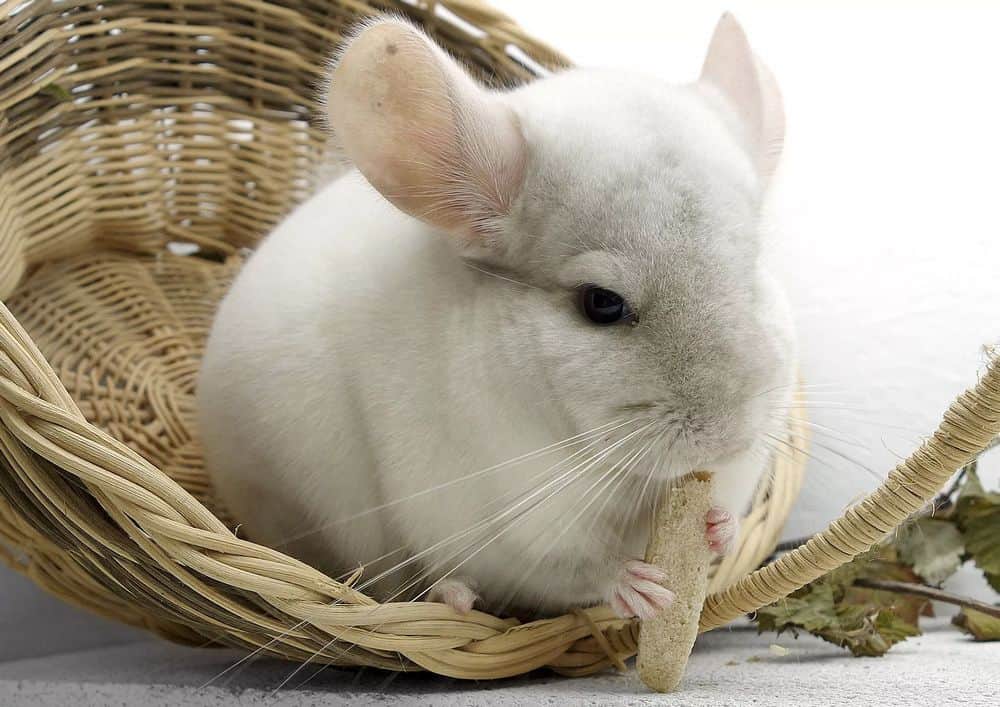
For many of these symptoms, it is important to keep in mind that an underlying illnesses may be causing them. A good example is a tooth problem causing a lack of appetite.
But these symptoms are still signs that something is wrong with your chinchilla.
A lack of appetite is no exception, and it is honestly one of the easier signs of chinchilla illness to recognize.
For me, I know how quickly my chinchilla will go through her hay feeders of timothy hay and her bowl of pellets in her cage.
If this were to dramatically slow down, I would know without a doubt that something is wrong.
If this happens to you, make sure you seek the opinion of a vet to diagnose the issue.
Going too long without consuming the proper nutrition will ultimately cause a chinchilla to die.
Consuming Less Water Than Usual
Another sign that your chinchilla may be falling ill is water consumption. Chinchillas always need to have access to fresh water.
If you notice that the water bottles attached to the cage don’t need to be filled as often, or your chinchilla does not seem interested in consuming fluids, it could be an indication that something is seriously wrong with your chin.
Skin And Fur Problems
While chinchillas have one of the softest and most appealing fur coats out of any animal, this can change.
Illnesses such as ringworm, fungal infections, and bacterial infections can occur, which can cause issues if left untreated.
Typically, you will be able to spot these issues by recognizing bald batches or irritated skin. Sometimes, you may even need to shave your chinchilla to correctly identify an issue. Make sure you talk to your vet first, of course.
A good way to ensure your chinchilla does not fall victim to any of these fur problems is to ensure you provide a clean chinchilla cage and keep it at the proper temperatures.
It is also a good idea to spot check your chinchilla’s fur every few weeks when you have it out of the cage.
Heat Stroke
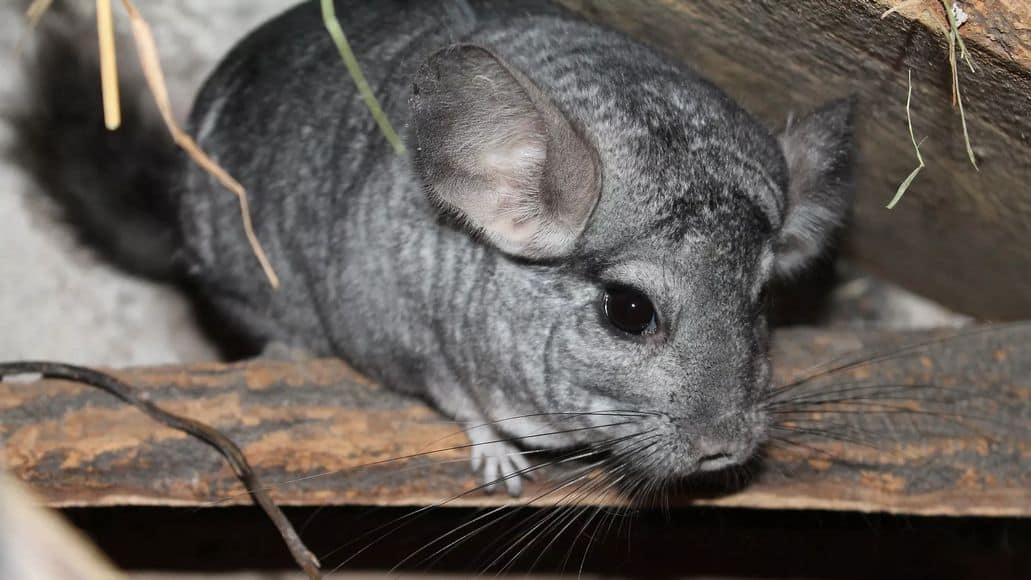
Temperatures that exceed the recommended guidelines for a chinchilla’s environment are another factor to be incredibly careful about as a new chinchilla parent.
If you need to get up to speed about how to provide an ideal climate and environment for your chinchilla, you can refer to my post here.
The main takeaway here is simple.
Chinchillas must remain in cool temperatures with relatively low humidity. Not doing so can easily cause heat exhaustion, heatstroke, and other health complications.
The primary reason for this issue is the fact that chinchillas have such dense fur, which makes it tough for them to cool down. They also lack the ability to sweat.
This is also the primary reason a chinchilla can never be kept outside.
Be sure that if you plan to adopt a chinchilla, you have a climate-controlled and safe area for your it to be housed.
This is typically going to be a spare room, a mudroom, or even a basement that still gets some form of natural light, keeping your chinchilla in its normal sleeping rhythms.
You can also invest in chiller granite stones to place inside your chinchilla’s cage.
- Made of granite stone to keep chinchillas cool and healthy
- Can be placed anywhere inside chinchilla's home
- 6-Inch long, 10-inch wide
These help your chinchilla have a cool spot inside of its cage to cool down.
Lack Of Feces Production
Poop production is an easy thing to notice owning a chinchilla.
It is basically nonstop, and if the production slows down, it is not going to be hard to notice.
Ensuring that your chinchilla continues to poop at the normal frequency and that the poop continues to look normal is another way to stay ahead of any potential illnesses.
If your chinchilla stops poop production, it could indicate some form of intestinal blockage or other illnesses.
It could also mean that your chinchilla is not eating as much as normal, which could indicate other illnesses.
If you notice a lack of feces production, it is an excellent time to contact a vet and let professionals advise you of the next best steps to take.
How To Handle, Treat And Care Common Illnesses In Chinchillas
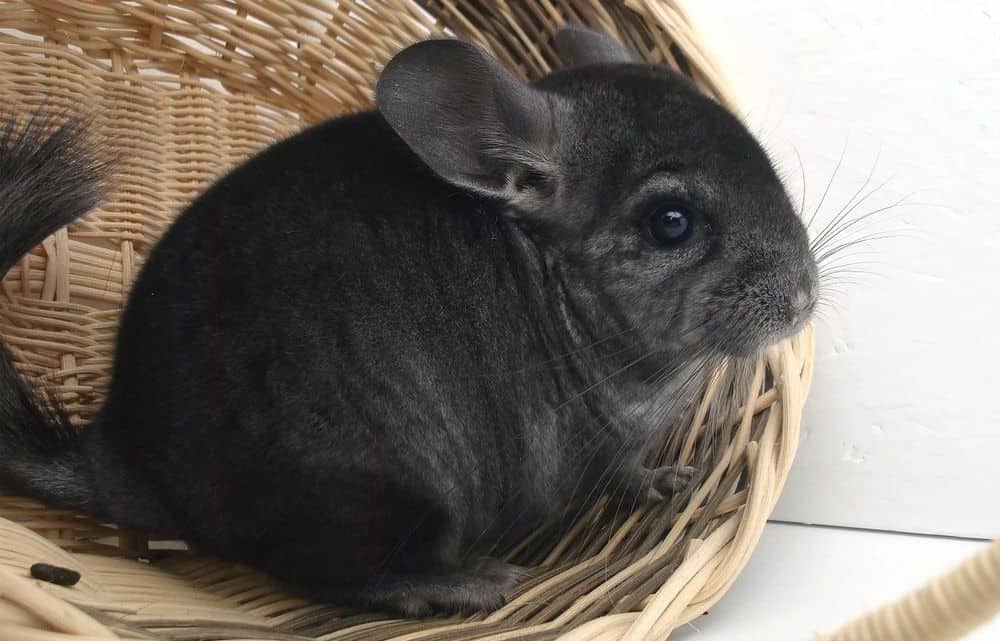
Now that we have an idea of some of the signs of illnesses or indicators of a deathly ill chinchilla, it is good to understand what you can do to help your pet in these situations.
Again, do not forget what I stated at the beginning of this post.
I am not a vet, and if you notice any of the illness indicators we have discussed thus far, or other signs of problems like your chinchilla’s ears being down, it is best to consult a vet.
However, some of your next steps and best courses of action are going to be relatively universal when it comes to a sick chinchilla.
Let me explain by breaking down the most common and most ethical things you can do as a chinchilla parent.
Examine Your Chinchilla Regularly To Detect Issues Early
This is likely the best advice I can give any chinchilla owner.
It is also the easiest thing you can do to ensure your chinchilla remains healthy and that you have a strong chance to detect illness and issues early, helping prevent death.
This includes examining your chinchilla’s teeth, as we mentioned previously.
It is also best to always check its fur for any abnormalities.
Checking your chinchilla’s genitals at least once a month can help prevent illnesses and infections such as chinchilla hair ring as well, which can be deadly if it prevents urination or reduces any blood flow.
Treat Illnesses Based On A Vet’s Recommendations Only
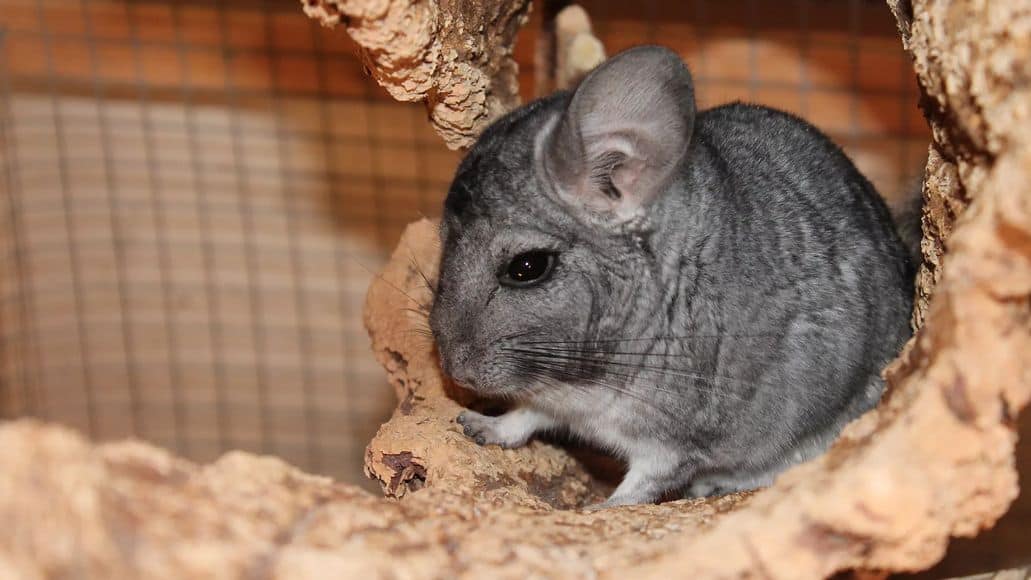
The second-best thing you can do is get the advice of a professional once you have detected an illness with your chinchilla.
Often, a vet can quickly help you trim your chinchilla’s teeth or improve other tooth-related issues.
Vets can also help you by providing antibiotics to treat common bacterial or fungal infections that can arise. Chinchilla’s can’t catch the human cold from the virus, but they can catch it from bacteria from secondary infections that accompany the cold.
If you believe it is more related to overheating, you can wrap your chinchilla in ice packs and take it to the vet for further treatment.
If it ever gets to where you believe an illness or emergency is becoming life-threatening, absolutely take your chinchilla to a vet as soon as possible, after rendering what immediate care you can.
You never know what might be wrong. Did you know chinchillas can catch covid-19? It is rare, but not impossible. And they can transmit it to you, too.
Do Not Forget About Depression
Depression is something that is not often discussed when it comes to owning a chinchilla, but it can be a real issue.
While it is not technically considered an illness and is not treated with medication, it is still something to take seriously.
Chinchillas need social interaction and to have a loving home.
If it is not possible for you to interact with them often, it may be best to consider bonding your pet with a second chinchilla or just not adopting a chinchilla in the first place.
While depression won’t become an immediate threat to your chinchilla’s health, it could eventually lead to issues such as more anti-social behavior, lack of appetite, and yes, even death, if any of the other illnesses or lack of eating become a more significant or prolonged issue.
Simply put, a chinchilla needs a little love and a little attention to thrive and remain healthy.
Providing Adequate Care To Avoid Illness And Death
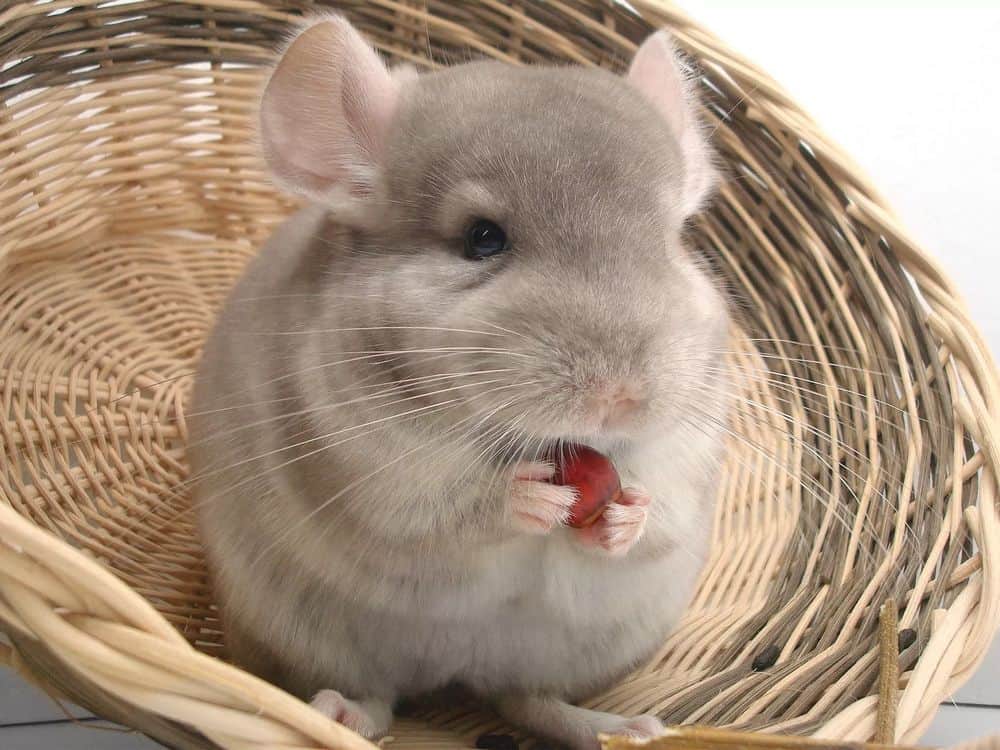
We all set out to provide excellent care for our chinchillas when we ultimately decide to adopt.
No one is questioning that.
However, providing the best care possible out of the gates can help negate some of the potentials for illness and death. Tat is why it is important to be educated from the beginning and to stick to some basic principles.
As mentioned previously, it all starts with providing an adequate environment that is climate controlled and safe for your chinchilla.
Next, it is imperative that you provide your chinchilla a large enough cage to allow it to move around freely and safely.
I always recommend the Critter Nation 2 Dual Level Cage.
- Solid and durable construction
- Great size with four levels
- Great platform fit for accessories like fleece liners
- Sits on wheels making cleaning easy
- Under cage storage
- Total of four doors, making access very easy
- Large cage making it unsuitable for tiny spaces
- One of the higher costing cages but for good reason; it is easily the best value for money
It certainly has the size and plenty of options for providing other excellent accessories that help your chinchilla thrive.
This can include the ease of adding comfortable fleece liners.
- Designed specifically for Critter Nation Cage
- Includes: Two large pan liners (one with a notch/cut-out for the ramp opening, Two small shelf liners and three ramp covers
- Available in various designs
It also includes the ability to add the best chinchilla toys to your chinchilla’s cage to allow it to play and chew as much as it needs to keep its teeth healthy.
You can always read my review of the Critter Nation 2 cage here if you need additional information.
After you have a safe environment and one of the best chinchilla cages available, the next best thing you can do is provide some form of social interaction for your chinchilla as often as possible.
This can be time out of the cage playing and interacting with you or the potential of another chinchilla in the future after taking the time to bond the two chinchillas properly.
Lastly, always provide the best diet you can for your chinchilla.
This includes providing the best chinchilla hay and chinchilla formulated pellets.
This combination of food will provide the necessary fiber and protein your pet needs to remain healthy, in addition to many other benefits.
If you can get these essential tasks completed, you will be in much better shape to ensure your chinchilla is going to live a long and healthy life.
How Do You Know When A Chinchilla Is Dying?
Unfortunately, you will never precisely know when your chinchilla is dying.
It does not typically happen in this fashion with chinchillas.
While some owners report lethargic behavior and lack of appetite in the days leading up to death, others report that death was more sudden and completely unexpected.
The best thing you can do is simply monitor your chinchilla and understand when illness does strike, so you can intervene as quickly as possible.
What Can Cause A Chinchilla To Die?
We have basically touched on this topic in full depth already.
Many things can cause a chinchilla to die, but most frequently, a chinchilla will die from heatstroke, respiratory infection, or another illness that causes a lack of eating.
While these aren’t the only causes of death for a chinchilla, they make up a good majority of the deaths that owners report. It’s imperative to follow the guidelines we have laid out thus far to help recognize and treat illness as quickly as possible.
An Unfortunate Sudden Death
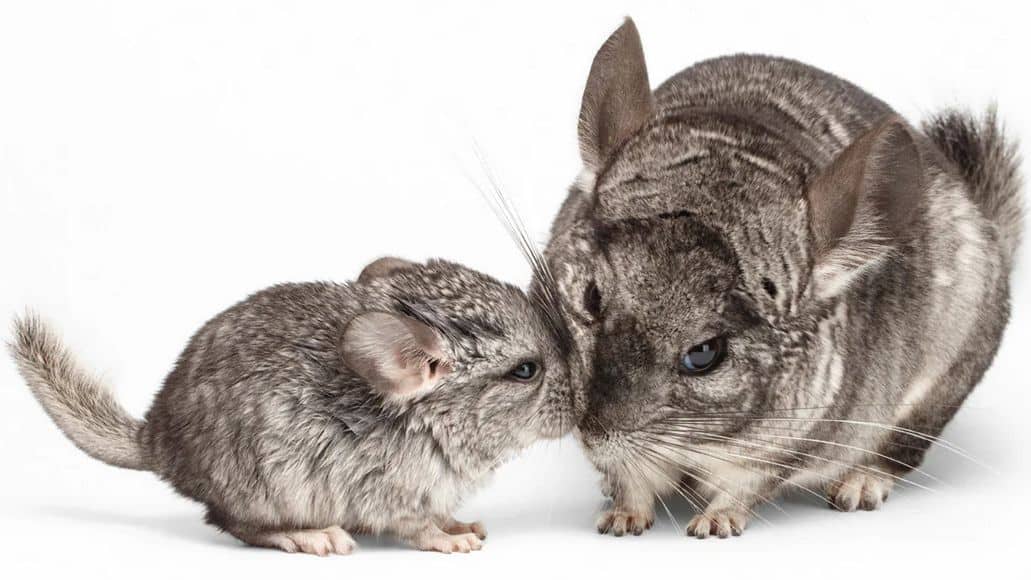
Unfortunately, I do not know the circumstances of everyone who is reading this post.
I am not sure if you are doing preliminary research before adopting a chinchilla, believe your chinchilla is ill right now, or possibly your chinchilla already died, and you just have to know why.
Therefore, I want to make sure that I give you a bit of peace of mind about the situation.
Pets die, unfortunately.
They can die even when we do everything by the book and provide the best care possible.
As much as I hate to say it and think of any of my pets falling into this group, I do know it happens, and it will happen to many of us.
If it has happened to you with your chinchilla, myself and the Planet Chinchilla community certainly feel for you and wish you the best and hope you decide to get another chinchilla in the future.
The point I am trying to make is simple but a bit sad.
Sometimes, sudden death or something that can’t always be prevented will happen. It’s just part of owning a chinchilla.
These are relatively fragile rodents.
They bring us tons of joy while we have them, and more than likely, you can have a bond that lasts more than 15 years.
But sometimes, it does not happen like this.
Old Age Happens With Chinchillas
I think most of us are familiar enough with pets to understand that death may have nothing to do with illness, and could simply come down to old age.
Typically, chinchillas will live around 14-17 years. But not always, and all chinchillas are different.
Nonetheless, old age does happen with chinchillas, and it is not uncommon for them to die once they have lived this long.
My Chinchilla Is Lying On Its Side…Is It Dying?
If your chinchilla is lying on its side, it does not necessarily mean it is dying, but it likely means trouble.
This could be a sign of heatstroke or another illness.
If this is your chinchilla and it is a behavior that you have never noticed in the past, you need to get ahold of your vet as quickly as possible.
A chinchilla lying on its side is an indicator of illness or potential death, so get your chinchilla the attention and care it needs as quickly as possible.
Chinchilla Dying Signs: Final Thoughts
This has not been the most enjoyable posts to write for the Planet Chinchilla Community.
It is not fun to think about this side of chinchilla ownership and parenting, but unfortunately, it is part of the package and part of your responsibility to understand if you plan to adopt a chinchilla in the near future.
Chinchillas becoming ill or dying is part of the deal you are enrolling in when you decide to adopt, and the more knowledge you have right out of the gates, the better.
Chinchillas make for excellent family pets. With the right care, they can live exceptionally long, happy, and healthy lives.
Chili and I certainly wish you the best of luck with your chinchillas and hope illness and death is not something you have to deal with.
At least, not for a long time.
Share your thoughts.
Do you have any further recommendations that can help the community to recognize an illness or potential death warning sign with our chinchilla’s?
Do you believe any further information about chinchilla illness and death needs to be added to this post?
Be sure to share those thoughts, stories, and concerns by dropping a comment below.
As always, Chili and I appreciate you stopping by and reading today, and we will see you again next time.



J says
RIP Tyson
3month old male I had for a week before he passed yesterday 💔
Annie says
Sorry to hear that. We adopted a 7 year old male about 5 months ago and he died a few weeks ago and we were not expecting it. We miss him so much, but we plan on getting another chin in a few months.
Linda says
I have a male gray chin. He’s 23 years old. I think he’s in his final days. Pray for Luigi he’s been such a joyful friend.
Josh says
I’m sorry to hear that. Losing a pet is always such a sad thing. 23 years, though! That’s amazing. And great name, too!
Amber says
We just lost our 6 month old chinchilla Suki last night. Had her for a month. Because of weather conditions no vets were open yesterday. I just keep thinking I should have done more🥺
Josh says
Oh, no, that’s horrible! But if no vets were open, it doesn’t sound like there is much more you could have done.
Caron Van Schalkwyk says
I lost my very old man over this Easter weekend he was such a joy lived for years with three legs and a heart murmur; he was a rescue.
I am worried about his mate. She is such a soft little thing, and I am not sure when to introduce her to another one.
Josh says
I’m so sorry to hear that. As for introducing the mate to a new chin, the timing isn’t so important. What’s important is to do it slowly and let her accept the new chin at her own pace.
Jake says
I had my buddy Knot for barely a month. He was the first pet I got on my own and I feel so guilty for not being able to do anything. The only thing I was able to do was give him a peaceful place for him to go.
Jake says
My brother, John Chillenger II has left this earth suddenly after 14 years of life. He began shallow breathing and passed within minutes of me coming home from work.
I think he was waiting for me to come home to say goodbye. It’s going to be strange not being greeted by my boy every night.
Josh says
That’s very sad and my condolences. But….was your brother a chinchilla?